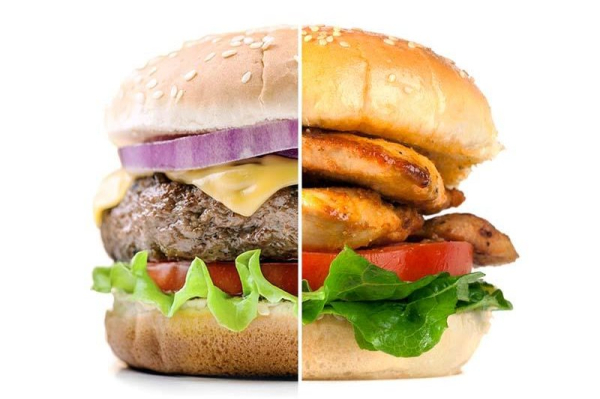
Substituting chicken for beef could reduce greenhouse gas emissions from people’s diets by up to 48% and improve their health at the same time, according to a new study of the eating habits of Americans. Photo courtesy Tulane University PR
Substituting chicken for beef or plant-based milk for cow’s milk could reduce greenhouse gas emissions from people’s diets and improve their health at the same time, according to a new study of the eating habits of 7,700 Americans out Friday.
The finding that simple substitutions could cut the average American’s carbon footprint by 35% while boosting diet quality led researchers at the University of Tulane to conclude the baby-steps approach might persuade people to adopt climate-friendly diets. Advertisement
The study, published in the journal Natural Food, looks closely at beef because it is a primary contributor to the 25% to 33% of U.S. greenhouse gas emissions that come from farming and the fact 20% of study participants reported consuming at least one portion daily.
Simulations show that swapping ground beef for ground turkey slashed the greenhouse gas emissions of the beef-eaters’ diets by 48% and indirect water consumption by 30%.
“This study shows that cutting dietary carbon emissions is accessible and doesn’t have to be a whole lifestyle change,” said co-author Diego Rose, nutrition program director at Tulane University School of Public Health and Tropical Medicine.
“It can be as simple as ordering a chicken burrito instead of a beef burrito when you go out to eat. When you’re at the grocery store, move your hand one foot over to grab soy or almond milk instead of cow’s milk. That one small change can have a significant impact,” Rose said. Advertisement
The research identified commonly eaten foods with the highest climate impact and simulated replacing them with like-for-like alternatives offering equivalent nutrition but with a lower carbon footprint.
“For us, substitutes included swapping a beef burger for a turkey burger, not replacing your steak with a tofu hotdog,” said Anna Grummon, co-author and Stanford University assistant professor of pediatrics and health policy.
“We looked for substitutes that were as similar as possible. The largest projected reductions in emissions were seen in mixed dishes: burritos, pastas and similar popular dishes where it’s easy to substitute a lower-impact protein instead of beef,” Grummon explained.
Building on previous research, the study posited that changing children’s diets would help establish positive habits more likely to be lifelong with a meaningful impact on the carbon footprint, compared with adults switching from one animal protein to another.
Grummon said the team’s discovery switching to lower-carbon foods delivered “sizeable improvements in how healthy the diets were” was an unintended by-product of the study.
The study argues that its evidence shows small changes could have a major effect, although they were not a panacea for tackling head-on climate change or individual health concerns.
“There is overlap between sustainable diets and healthy diets,” added Grummon. “Our study shows that changing just one ingredient, making one swap, can be a win-win, resulting in meaningful changes in both climate outcomes and how healthy our diets are.” Advertisement
Stanford’s Cristina Lee and Thomas Robinson and Harvard University’s Eric Rimm were also co-authors of the study.